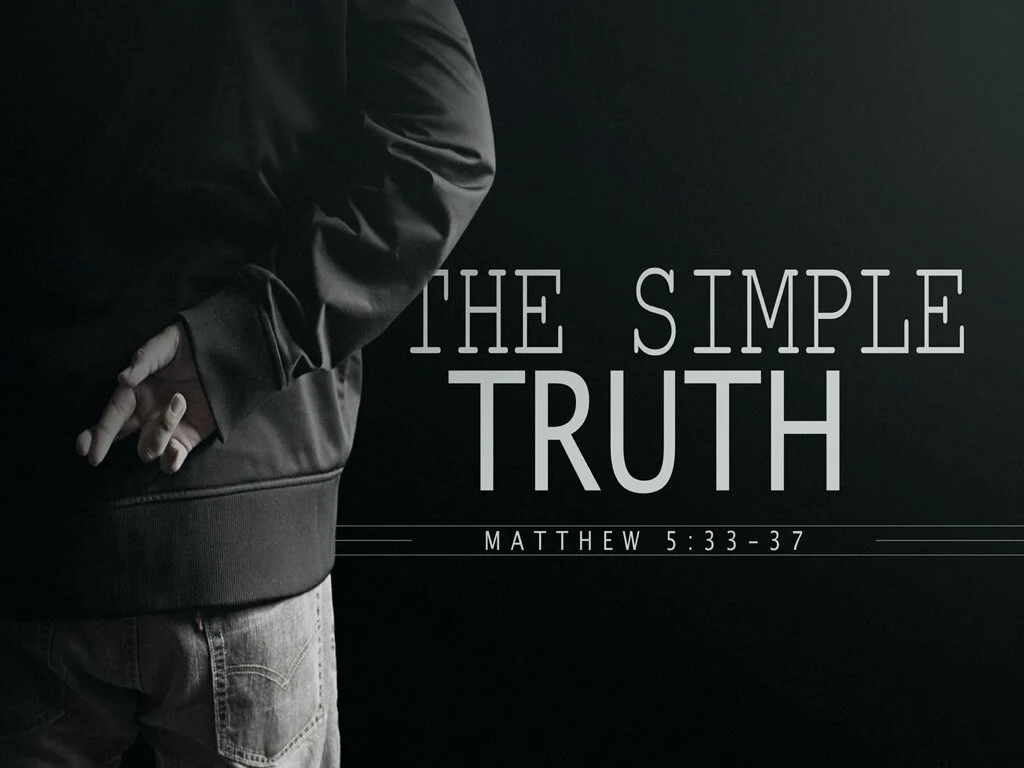Matthew 7:13-29 - True Discipleship
We are wrapping up the Sermon on the Mount this week and I hope this study has spurred you to look more deeply at the life Jesus has called you to as his follower and the kind of life we are called to in community together. Before Jesus preached this sermon, he proclaimed “the good news of the kingdom…” As diverse crowds of people came to see his healings and listen to his teachings, he went up on a mountainside and sat down. From the crowd, those who answered the call to follow him came forward and he began to teach them. The crowd still heard his teachings but there is now a distinction between those who are “amazed at his teaching, because he taught as one who had authority” (7:28-29) and those who answer the call to follow Jesus by putting his teachings into practice (7:24). In the Sermon on the Mount, Jesus lays out the narrow way of following him.
Following Jesus is a journey of transformation. We should never be too comfortable with where we are because we have not finished the journey. We continue to return to the Sermon as our guide. Jesus teaches as one who has authority to determine what is authoritative, unlike other teachers who received their authority from someone else. Therefore, Jesus’s difficult teachings cannot be separated from who is. When you become very familiar with the Sermon on the Mount and then go on to read all of Matthew, you will see that Jesus’s life is a commentary on the Sermon. To say it differently, the Sermon is the snapshot of Jesus’s life and therefore the life we are called to live as his followers. When we read Jesus’s difficult teachings, we must open ourselves to be challenged and changed rather than justifying how the teaching doesn’t apply in specific instances in our lives.
I ended my sermon last Sunday with the passage on the “Narrow and Wide Gates” in 7:13-14 and I want to begin there this week. Following Jesus, one step at a time, is the narrow way. The words of his Sermon, put into practice in our lives, is the narrow way. Following the ethics of any political group that runs against the teachings of Jesus is walking the broad road. Societal teachings, when they run against the way of Jesus, are the broad road. Traditionalism within churches, when they lead to practices that do not look like the way of Jesus, become part of the broad road. Our commitment to following Jesus in his footsteps should challenge every aspect of our lives to make sure our sights are firmly set on the way of Jesus and nothing else.
Many will come along and proclaim ways of living that are not of Christ. They provide a bad model for ordinary Christians. When we speak of “false prophets” we often speak of people who do not speak the truth or are lax on something we are more serious about. Reading in context this time around, there seems to be more emphasis on those who come along who fail to call people to discipleship. We’ve sometimes placed more emphasis on the false teaching being some sort of wrong belief (and there is need to sort this out) but this passage seems to place more emphasis on right living more so than right belief. While right belief has some importance, what is more important is that your life is changed because of following Christ. Are you a less anger filled person than you were 10 years ago? Are you less prone to violent thoughts? Are you more of a presence of peace than you were? We could continue making a list but the point is that following Christ leads us to look more like Christ more so than a certain set of beliefs (again, beliefs are important). Any voice that isn’t calling us to take steps in the way of Jesus should be met with suspicion and weighed against Jesus.
The climax of this section, and of the Sermon, comes in 21-23. These verses are among the most important in Matthew’s Gospel. They fall within the call of Jesus for our righteousness to surpass that of the Pharisees and the scribes (5:20) and make it even more explicit. You cannot simply possess the teachings of Jesus and be considered righteous in the Kingdom of Heaven. One must receive the teachings and then act upon them. This is reaffirmed at the end of the gospel with the Great Commission, calling people to be doers of Christ’s teachings, to obey his commands (28:18-20). Many will claim to know the proper teachings of Jesus and will even do incredible things in his name. Jesus says he will tell them plainly, “I never knew you. Away from me, you evildoers!” People who are of “the Kingdom of Heaven” are the ones who do the will of the Father. This takes a close and intimate walk with Jesus where you follow in his footsteps and begin to look more and more like him.
Jesus ends with the parable of wise and foolish builders. Put his teachings into practice and you will be wise. Don’t put them into practice and you will be foolish. This chapter then ends with the crowds being amazed by his teaching because of the authority he carries. What is your response to Jesus’s teachings? Dismissive because they are not practical or are inconvenient for life today? Are you amazed with the crowds? Or, will you be a disciple of Jesus, hear his words, and get up and follow him on the narrow path?
Matthew 7:1-14 - Check yourself before you wreck yourself
As we move toward the end of Jesus’s Sermon on the Mount, it is important to keep in view the full context of what Jesus is saying, avoid legalistic readings, and misinterpretations of what Jesus says. I’m going to divide up this section a little differently than how your Bible translation likely placed the subtitles. Most notably, I believe the teaching about “pearls before swine” stands on its own and has little to do with judgment. Also, the “Golden Rule” stands as a summary on the sermon and the “Narrow gate” teaching acts as a transition to the end of the sermon.
7:1-5 - Judging Others
Much like Jesus’s prayer where we are called to forgive others because God has forgiven us, Jesus calls us to be generous in our judgment of others because God is generous with us. Jesus gives this basic teaching through a ridiculous image of a person with a log in their eye trying to preform precise surgery on someone else’s eyes who has some sawdust in theirs. We must avoid reading this as mere good advice about people treating you as well or as badly as you treat them. While there is truth in this, Jesus dives deeper into God’s divine judgement. We also need to avoid the pitfall of interpreting this teaching a license to not take sin seriously, “If you tolerate the sins of others, you will escape the last judgment unscathed.” The basic application of this teaching is this: If you are harsh in your judgement of others, when God is so generous in his judgement of you, you must expect to be judged harshly by the one who judges all. This seems to have some echo in the parable of the unmerciful servant in Matt 18:23-35.
After God has dealt so graciously with our many shortcomings, how then can we dare treat others with such mean-spirited judgementalism? Judgementalism draws conclusions before asking questions. It cares not about relationship or restoration. This kind of view places the focus others while doing very little to be present to the transformation needed in your own life. This passage reminds us that the call to follow Christ begins with your own submission to Christ’s transforming presence in you before you attend to the transformation that needs to take place in others. Jesus’s teaching brings to light that destructive criticism is counterproductive and harsh and petty faultfinding becomes corrosive and erodes relationships in a community called to work together to become salt and light in the world.
v6 - Pearls before Swine
Verse 6 is an odd fitting comment for the discussion on judgment. “Dogs” and “Swine” were common labels for Gentiles, with “Swine” often being used in reference to the occupying Romans. Many scholars believe Jesus is giving a brief teaching about allegiance as he transitions into the teaching on asking for the good gifts the Father is ready and willing to give. Your allegiance is a precious gift to give. Are you giving it to the Kingdom or to those who will “turn and tear you to pieces” as soon are you are no longer useful?
7-11 - Ask Seek Knock
When you knock on the right door, and give your allegiance to the right Kingdom, good gifts will be given. This teaching is not a prescription for a kind of persistent prayer that twists God’s arm if you ask enough for whatever you want. It is to say that you have a King, a Father, who is intent on giving you good things. Is your allegiance to those who only have their best interests in mind or will you knock on the door of the one from whom all good gifts come?
v12 - Golden Rule
Jesus wraps up this part of his sermon with what is called a “therefore ethic.” So much of what Jesus says up to this point can be summed up in what is known as the Golden Rule: Do to others what you would have them do to you. In its Christian context, the Golden Rule is deeply connected to the love for and nonviolent response to our enemies (Luke 6:3 makes this connection more directly), giving it a loftier ideal than a mere calculating of one’s self-interest in applying the rule. Take some time to explore the “Rule” within its context in Luke. Matthew places this rule at the end of Jesus’s teaching on righteousness (beginning in 5:20), making it a summary of all his ethical teachings. It is a kind of shorthand for how to do life in the Kingdom of Heaven.
13-14 - Narrow Gate
Many sermons have been preached articulating how we are doing Christianity correctly and others are doing it wrong. I’ve heard this passage misused as a way to say one groups narrow understanding of a passage of scripture is justified because “narrow is the way” and therefore the way others read the passage “leads to destruction.” This is a dangerous form of judgementalism that misses the intention of this text all together. I really like the summation of one commentator’s writing, “It is not necessary for us to know the ratio of damned to saved. What is essential is that we take with utter seriousness our responsibility to do what is right.”
Jesus will end his sermon saying, “Wise are those who hear these words and put them into practice.” The one who engages in the difficult journey of transformation where the sermon is put into practice is the one who has chosen the narrow gate. Neglecting the disciplines Christ calls us to as his followers places us on the broad road where destruction is the outcome. Or as Jesus says it, “the rains come and the house goes splat.”
Matthew 6:19-34 - Where is your heart?
As people called to be Salt and Light in the world, we follow the way of Jesus through heart transformation to where the outward expressions of our faith are seen in how we respond differently to the world around us. These responses are on display for the world to see and therefore ask why we are so different. Our faithful response becomes our witness to what Christ is doing in our lives to make us salty and lit for the world to taste and see. Last week, we transitioned into chapter six where Jesus calls us to question our motivations for the spiritually formative practices we engage in, “Be careful not to practice your righteousness in front of others to be seen by them.” He advocates for a secrecy in these practices where we do not even realize we are doing them. They are merely tools focused on accomplishing an end game of Christ likeness. This self-forgetfulness in our spiritual formation opens us to the Spirit’s guiding in transformation.
I only briefly mentioned fasting last week but it leads us into what Jesus says about our treasures and our worry. Fasting, while it may be difficult, should develop a deeper sense of joy because it connects us to the gifts which make our lives livable. Fasting isn’t about despising our bodies and neglecting our needs. A life of fasting “is to learn to live without what I assumed I could not live without” (Hauerwas, Matthew Commentary). Fasting brings low levels of suffering which reveal our freedom because nothing enslaves us more than that which we think we cannot live without. The powers of this world enslave us to our desires, cravings, personal rights, and ideals of security. Fasting reminds us that life isn’t about bread but about living “on every word that comes from the mouth of God” (Mt 4:4).
Stanley Hauerwas always has a challenging word for me and trying to sum up his transition from fasting to treasures would fail to do justice. He says, “Fasting involves the discovery of who we serve. We cannot serve God and wealth, but we will also be told that we cannot serve God and the emperor (Matt. 22:15-22). There is, moreover, a close connection between wealth and the emperor because we believe that our wealth depends on the security offered by the emperor. After all, emperors always claim to be our benefactors. We may regret what emperors do in the name of our security, but we dare not oppose them because we fear losing what we have.”
Fasting is difficult, not because it causes a temporary pain in the body, but because it reveals in us the tight grip we have on our things and on being the source of our own security. In his teachings on where our treasure is and our worry, he invites us on a journey of transformation. A walk with Jesus is one of calling us deeper into our transformation. It is easy to draw legalistic lines in these passages or weaponize them against others. I find it fascinatingly ironic when I read a blog criticizing “rich” Christians for their wealth when the blog was likely written on a $1200 laptop while sipping a $6 coffee. Richness is relative and it is always easy to criticize those who have more than me while forgetting that I am incredibly rich by comparison to the rest of the world. Let these teachings of Jesus invite you on a journey of self-examination rather than judgment or justification.
“Where your treasure is, there your heart will be also,” says Jesus. Does this mean you cannot have a 401k? Are you unfaithful if you have savings? There are extreme teachings on this passage that should not be ignored but I don’t think you get to those convictions overnight or through one blog. You get there in steps of letting go. We find it impossible to live the way where Jesus calls us to give up all our stuff because we’ve lost sight of what the Christian community is called to be in how we take care of one another. I’m not advocating for communism because that is forced on people. But I do believe it is impossible to live a life fully detached from our things if we do not have a community committed to taking care of one another.
When we “seek first the kingdom and his righteousness” a community will form where there is no need for worry. This is the kind of community that stands as salt and light in a world where things are worshipped, and people are used. Worry is the air we breathe. So much so that we do not realize how much we worry. When our concern becomes the Kingdom of God, first and foremost, we will have no need to worry about the state of the nation, the economy, culture wars, etc. etc. etc. Concerning ourselves with what matters most frees us from the concerns about tomorrow found on the page of every newspaper you’ll open today. We need creative people to step forward and imagine how to become the kind of community where people can let go of their treasures and worries and embrace the peace offered to us through Jesus Christ.
Matthew 6:1-18 - Check your Motivations
We’ve wrapped up the first part of Jesus’s sermon where he focused on the outward expressions, of faithfully following him, cultivated from heart transformation. Jesus calls us to step out of the crowd, to be his disciples, and to become citizens in his kingdom. This kingdom is to then be salt and light to the nations wherever it goes. When Christ followers invest too much in the power struggles of the nations, we risk losing out grip on what it means to be citizens of the Kingdom of God (what Jesus proclaims as the good news in Matthew’s gospel). Engaging in culture wars in order to win the power to enforce how people should live means we have focused more on creating a world where we will be comfortable rather than engaging in the discomfort of salt and light relationships that transforms the world around us. In this struggle of power, the gospel is lost. In this first part of Jesus’s sermon, he shares hard teachings for heart transformation which enriches his community of followers to be salt and light in the world.
Much of this first section focuses on how his followers are to look and act in the world. The major focus of this week can be summed up in the repeated phrase, “in secret.” Jesus says that our giving, prayer, and fasting should all be done “in secret.” I want to get to the heart of this teaching, but first I want to offer two cautions. First, avoid making this teaching legalistic. Second, do not weaponize this teaching to then judge others.
Legalistically following these teachings distracts the Christ follower from the heart transformation to which Jesus calls us. Legalistic avoidance of others knowing what you do in your practices of spiritual formation refrains from a positive form of “peer pressure” where others are encouraged to strengthen their practices. As Paul says in 1 Cor. 11:1, “Follow my example, as I follow the example of Christ.” How could they follow his example if he’s practicing his disciplines in secret? This legalistic following of Jesus’s teachings creates a kind of self-centered focus on piety (with the best of intentions) where the concern is still on the perception of others.
Weaponizing this text places us in a position of evaluating and judging others with any expression of piety. In many Christian traditions in our culture, outward expressions of worship are met with criticism of being “showy” or “look at me” in their worship. This kind of judgmentalism has discouraged others from expressing themselves in their worship through raising their hands, kneeling, swaying, dancing, clapping, etc. All these things are mentioned and even expected in scripture (some would argue they are commanded). Jesus is not giving us ammunition for tearing down Sisters and Brothers in their worship and spiritual disciplines.
“Be careful not to practice your righteousness in front of others to be seen by them,” says Jesus in this transition of his sermon. This is the framework in which to examine the heart of what Jesus says in our section this week. What is your motivation for what you are doing? Only you can determine that. The community of Jesus followers should develop and support an ecosystem in the regularly gathered community so that spiritual disciplines can develop and bring transformation. When judgmentalism is evident within the community, spiritual formation is squelched. It is as though the church community becomes the vine in which each branch should be connected rather than being the trellis that aids the branch to be connected to the True Vine (Jesus…to be clear).
Giving to the needy – “Do not let your left hand know what your right hand is doing…” Jesus calls us to a level of secrecy in our giving that we do not even realize we are doing it. Be so un-self-focused that being a giving person becomes who you are. This is reminiscent of the parable Jesus shares in Matthew 25 where those who are righteous will respond to him saying, “Lord, when did we see you hungry and feed you…” and Jesus will respond, “Whatever you did for one of the least of these…you did for me” (25:37-40). There is a certain forgetfulness that comes with the righteousness Jesus calls his followers to. Those who know they are righteous are in danger of losing their grip.
The same goes for prayer and fasting. Prayer takes on different forms and we should be careful in our evaluation of how others pray. These passages are best served for one’s own internal evaluation. What’s your motivation for how you pray out loud? When you fast, is it for deeper connection with God or for others to see your holiness? Jesus assumes here that we are giving, praying, and fasting. These are essential for spiritual formation but our motivations for these practices must continually be evaluated to make sure we have the right end in sight. The more these practices become second nature to us, the less we will think about them because they become part of the natural rhythms of our lives.
Practice: The Lord’s prayer becomes a model for how we should pray and is a useful guide to lead us into deeper prayer:
‘Our Father in heaven,
Holy is your name,
your kingdom come,
your will be done,
on earth as it is in heaven.
Begin with recognizing God’s holiness and his agenda for bringing his kingdom to this world. This keeps us in check as people who continually long to be gods over our dominion and have our will done.
Give us today our daily bread.
We ask God to give us our daily bread as a recognition that we are incapable of providing for ourselves. This keeps us in check when we move beyond our basic needs and seek to control what is due us because of how hard we have worked. This proves to be a good lens through which we will examine 6:19-34 where Jesus challenges the focus and longings of our hearts.
And forgive us our debts,
as we also have forgiven our debtors.
Forgiveness is something that is much easier to receive than it is to give. Being honest in prayer about the level of forgiveness we have received from God opens us to the forgiveness we need to offer others. Allowing this guide to take you deeper, the Spirit will develop a heart of compassion within you where you evaluate the alleged wrongdoings of others with the heart of God and have compassion for them which spurs forgiveness.
And lead us not into temptation,
but deliver us from the evil one.’
The prayer ends with a recognition that life is filled with temptation. I prefer the translation, “let us not fall into temptation,” because I am uncomfortable with the notion that God is tempting us, which is sometimes assumed from this verse. Asking God to deliver us from the evil one is recognition of our inability to do this on our own. True deliverance comes with submission to God’s work in your life. When you try to deliver yourself from evil, you are still trying to be god of your own life.
The Lord’s Prayer is a good guide for listening to the Spirit nudge you into areas of your life where you still need to submit to God. Pray the prayer slowly and allow time for meditation on each section. Allow the Spirit to examine your life and lead you into transformation.
Refuse to be Enemies
Exodus 21:23-25
But if there is serious injury, you are to take life for life, eye for eye, tooth for tooth, hand for hand, foot for foot, burn for burn, wound for wound, bruise for bruise.
Leviticus 24:19–20
Anyone who injures their neighbor is to be injured in the same manner: fracture for fracture, eye for eye, tooth for tooth. The one who has inflicted the injury must suffer the same injury.
Deuteronomy 19:21
Show no pity: life for life, eye for eye, tooth for tooth, hand for hand, foot for foot.
Obadiah 1:15
“The day of the Lord is near
for all nations.
As you have done, it will be done to you;
your deeds will return upon your own head.
Matthew 5:38-48
“You have heard that it was said, ‘Eye for eye, and tooth for tooth.’ But I tell you, do not resist an evil person. If anyone slaps you on the right cheek, turn to them the other cheek also. And if anyone wants to sue you and take your shirt, hand over your coat as well. If anyone forces you to go one mile, go with them two miles. Give to the one who asks you, and do not turn away from the one who wants to borrow from you.
“You have heard that it was said, ‘Love your neighbor and hate your enemy.’ But I tell you, love your enemies and pray for those who persecute you, that you may be children of your Father in heaven. He causes his sun to rise on the evil and the good, and sends rain on the righteous and the unrighteous. If you love those who love you, what reward will you get? Are not even the tax collectors doing that? And if you greet only your own people, what are you doing more than others? Do not even pagans do that? Be perfect, therefore, as your heavenly Father is perfect.
Every society has a “rule of law” to provide a system for appropriate and justifiable relationships between people. We have the Constitution. England has the Magna Carta. The Jews have the Torah (first five books of the Bible). The difference between the Torah and the other two is that the Torah was handed down by God and therefore has a divine foundation. The Constitution and Magna Carta were put together by men and guided by different philosophies and world view. Exodus, Leviticus, and Deuteronomy (I threw in Obadiah as well) all show a societal structure that models retribution in kind for whatever is done. I’ve heard some explanations say that these laws show that you are to not go beyond equal retribution and therefore keeping peace in society. This kind of structure keeps violence from spiraling out of control.
Looking back at these laws in the Old Testament, I caught a different glimpse of their tone. These laws don’t seem to say, “take retribution all the way up to, like for like.” There seems to be more of a command to them. If a person does X then you must do X to them. Jesus speaks against this kind of justice system and calls his followers to create a society that embodies a better way of being. Deuteronomy says, “Show no pity,” but Jesus calls for something better. The law says that justice is required when wrongs are done. Jesus’s revolutionary teaching for his new society is to, “Show mercy and unravel the system of retribution that pervades our society” (Scot McKnight).
Jesus calls his followers to be peacemakers and refuse to fall into the cycle of vengeance that keeps the world of violence turning. The way of the peacemaker changes the world through small steps: Steps away from conflict, toward empathy. Steps away from confrontation, toward cooperation. Steps away from dogmatic monologue, toward a dialogue of equals.
The way of peace which Jesus calls us refuses to see others as enemy and embraces them as those who have the image of God within them. Jesus invites us to love our enemies as though they are neighbors. The overwhelming ethic of the way of Jesus is to love God and love neighbor. This even (and especially) applies when our neighbor has a lifestyle that is contrary to what we believe, says nasty things about us, and advocates for a different way forward for our country than I personally hope for. It is important to take stock of who you struggle to love and allow yourself to be drawn into the presence of God to learn to love them as he loves them. What does loving the LGBTQ+ community look like for Jesus? The illegal immigrant? The Democrat? What does loving the Trump supporter look like for Jesus? The Republican? The White nationalist? Please do not get stuck on the random list I’ve created. If there’s one of these that makes you uncomfortable, please allow the Spirit to invite you into reflective prayer.
Jesus ends this section with a call to be perfect, as our heavenly Father is perfect. This is a continual journey of transformation where we will never do it perfectly and therefore must always be making strides to move forward in allowing the Spirit to bring us to a place of transformation. One really important message I believe Jesus is sharing with us in where he places this call to perfection is that when we look at our enemies, we typically see all of their imperfections and in turn offer ourselves and those on “our side” all the grace needed.
Here are some steps to becoming the peacemaker Jesus has called you to be:
Know who your enemies are. Which group makes your blood boil, works you up, and gets you angry? Spend time in prayer asking God to reveal to you the way He sees them. Ask God to help you to see them as His image bearers and to see what love looks like for them.
Refuse to be enemies. We should expect that the world is going to hate us. Jesus promises that this will happen (John 15:18). Refuse to be enemies no matter what the world does.
Prepare how you will respond to the world in love. What does love require of you in any given situation? Does your idea of responding in love look like Jesus on the cross?
Jesus meets us where we are, in our sinfulness, to bring us into a transformative relationship where we continue the journey with him into our resurrection. What does it look like to meet people where they are and journey with them towards fullness in Christ found in the resurrection?
A Community of Integrity
Matthew 5:33-37
33 “Again, you have heard that it was said to the people long ago, ‘Do not break your oath, but fulfill to the Lord the vows you have made.’ 34 But I tell you, do not swear an oath at all: either by heaven, for it is God’s throne; 35 or by the earth, for it is his footstool; or by Jerusalem, for it is the city of the Great King. 36 And do not swear by your head, for you cannot make even one hair white or black. 37 All you need to say is simply ‘Yes’ or ‘No’; anything beyond this comes from the evil one.
As we approach the Sermon on the Mount, we’re exploring what it looks like to live out Jesus’s teachings and what kind of community is created in doing so. We are people who have stepped out of the crowd to receive the words of Jesus and become his kingdom community here on earth, amongst the nations as “salt and light” in the world. We no longer live in line with the ethical paradigms that the world offers us. We live on a different paradigm all together. When viewing the teachings of Jesus from the worldly point of view, they are impractical and near impossible. I believe this is because the worldly perspective is about power, position, and personal rights. Whereas Jesus’s Kingdom Community is about the laying down of power, position, and personal rights for the sake of redemption, reconciliation, and righteousness.
As with each section in the sermon, there are ways in which this teaching can be made legalistic and miss the point of what Jesus is getting at. There are some who have used this passage to avoid taking an oath in court or in office and others who try not to make any kind of promises. With any teaching, merit can be found. But what is Jesus calling his community of followers to in their life together and their life in the world as salt and light?
Jesus advocates for a deep level of integrity. A lot of what Jesus is teaching paints a picture of a community that could be rather than one that is currently in existence. Much like putting together a puzzle, we look to the picture on the box for guidance even when the pieces we work with don’t always bring a clear picture together. We live in a world of half-truths, convenient retelling of stories, and blatant lies. It is easy to point the finger at our political leaders in this, but Jesus is not concerned with them. Jesus paints a picture of a community of people that are attractive because of their deep integrity. When they say they are going to do something, they do it. These are not people who fudge the numbers on their taxes or will slight you when a better offer comes along. You know what you’re dealing with when you come across a follower of Christ.
As you go throughout your week, take a moment each day (or twice a day), and take stock of the things you said. Did you inflate the stories you told others? Did you rationalize your actions when you should have just apologized? Did you make empty promises? What other reflective questions would you add here?
There’s a rub with this teaching through. This is the ethical rub. Is there ever a time when lying is justified? To answer this question honestly, you must draw close to the heart of Jesus. When are times when telling the truth might come into conflict with “love your neighbor”? I think about this old example: You have Jews hiding in your attic and a Nazi knocks on your door. They ask if you have seen any Jews. In an attempt to not lie but also love your neighbor you respond, “Next question please.”
The teachings of Jesus are calling us to draw close to the heart of Jesus where our heart beats with his. This is not a legalistic examination of each word spoken but a cultivation of the heart that does not seek selfish gain through what we say and promise to those who listen to us. When we speak, people have no question that we are earnest.
In Jesus’s teaching throughout Matthew 5, “Love” is the ethic that drives living Jesus’s teachings. Take a day this week and try to speak only what love requires of you.
Sexual Ethic and Heart Transformation
Matthew 5:27-32
“You have heard that it was said, ‘You shall not commit adultery.’ But I tell you that anyone who looks at a woman lustfully has already committed adultery with her in his heart. If your right eye causes you to stumble, gouge it out and throw it away. It is better for you to lose one part of your body than for your whole body to be thrown into hell. And if your right hand causes you to stumble, cut it off and throw it away. It is better for you to lose one part of your body than for your whole body to go into hell. “It has been said, ‘Anyone who divorces his wife must give her a certificate of divorce.’ But I tell you that anyone who divorces his wife, except for sexual immorality, makes her the victim of adultery, and anyone who marries a divorced woman commits adultery.
I’d be lying if I said I was looking forward to this sermon. This is a really difficult topic and people have abused this passage in many ways over the years to justify what they’d like to do or weaponize it against others. Before unpacking what Jesus is getting at in this teaching, we need to remember the context of the sermon and Jesus’s aim. But first, some disclaimers:
First, this passage is a quick go to for people looking for a “Biblical ground for divorce.” The issue of pornography and problems it causes for marriages should never be downplayed but what is often said here is, “Jesus says that lust is the same as the action of adultery. Therefore, adultery was committed, and we now have grounds for divorce.” Applying this logic is dangerous, especially since we do not use the same logic regarding Jesus’s teachings on anger, name calling, and murder. Please do not hear me say that pornography is not a major issue. It is. But let’s be careful how this passage can be taken out of context.
Second, this is not a passage about extreme asceticism where a person abuses themselves as a show of outward piety. We need to note that Jesus is being hyperbolic when he calls for the plucking of eyes and cutting off of hands. He is calling for seriousness in how these issues are addressed. You can cut out both of your eyes and still struggle with lust. The issue comes down to the heart.
The context of the Sermon on the Mount is Jesus calling his followers to become a community that works as salt and light in the world. Sex is a beautiful gift God has given us, but we live in a culture where sex is cheapened to the fulfilling one’s own selfish desires. Sex is the most intimate of connections at the center of married life. When it is cheapened to simply being about pleasure it becomes a prize to be sought after rather than a gift shared. The church has not always done a great job about talking about sex and the culture has dominated the conversation. We often end up in a position of speaking against rather than advocating for.
The ancient world, in which the New Testament was written, was wild. I won’t go into all of the details, but we will just say that men in the Roman empire were encouraged to seek pleasure by any means possible. Use your imagination and then go three steps further (Rom 13:12-14; Gal 5:19-21; 1 Pet 4:3-4). The ancient world permitted men to pursue pleasure by any means possible and was often oppressive to women. Jewish sexual ethics were counter to that culture though the nod was still given to men to have power over women regarding divorce and sexuality. Most of the New Testament writings are seen as sexually oppressive but are liberating to women of the day because they call men to the same ethic. The trouble is that we’ve often placed the burden of sexual purity on the (covered) shoulders of women while dismissing the actions of men under the guise of “boys will be boys.” What does a Salt and Light community look like that teaches men to treat women with respect, beginning in the privacy of their home looking at their phones?
Jesus’s teachings in this passage can and should be applied to other aspects of life. Law following often focus on the outward appearance of a person, but Jesus addresses the issue of heart transformation. How seriously do you consider what content you take into your eyes and ears? This isn’t about hearing a curse word and worrying about saying the word sometime in life. This is about toxic speech, images of hate, scenes of diminished sexuality, graphic violence, etc. How do these things shape your view of the world. There is not a blanket rule here for what kind of movies a Christian should watch but a calling to protect the transformation of your heart through what you see and hear. That being said, anything that dehumanizes a person and makes them an object for your enjoyment (even if they agree to it) is unfit for a Christian to consume because it is toxic to the transformation of the heart.
When it comes to helping other men with the struggles of pornography, I often look to Matthew 12:43-45 as a model for what Jesus is talking about in today’s passage. Put the house in order by blocking sites on your phone, get an accountability partner, and do everything you can to stop consuming toxic imagery. But if you do not do anything to fill the house with God, the issue will always make its way back. This is true for other areas in our lives. Don’t just focus on what you’re cutting out but focus on what you are being filled with for the sake of holistic transformation.
Murder, Name Calling, and things more important than worship
How are you doing with murder today? Pretty good? How about your anger? Maybe not as good? I won’t even ask about the name calling you’ve done. But maybe it’d be good to check in on that? What labels have you placed on people this last week? Here are some examples: conservative/liberal, woke/racist, millennial/boomer, sheep, ignorant, moron, etc. Is name calling the same as murder? No. Is it on the same spectrum? Yes. Jesus takes this spectrum very seriously and calls his followers to rise above that spectrum all together to be a community of reconciliation in a world of discord and division. How important is it to Jesus that his followers become a community of reconciliation? He says that reconciliation is more important than the worship you bring before God. This is the lesson in a nutshell, but I want to dig in a bit more.
We live in an angry time. There are loads of articles dating back five years before the pandemic talking about how we live in an age of anger and then the pandemic turned up the heat on the pressure cooker of our society. In our post-pandemic time, it seems as though anger is just below the surface of most people in society. Road rage related shootings are on the rise. People are leaving the retail workforce in droves because of the stress with dealing with the public. Families are splintering over politics. Churches are drawing lines of division over culture wars, politics, understanding of history, etc. Anger is paramount in our culture. As followers of Jesus, we have to ask ourselves some hard questions:
Will we stay on the spectrum of rage the world offers us? Or will we embrace the way of Jesus, refuse to indulge anger, name calling, and drawing lines of us vs them?
Will we become salt and light to society by embodying what it means to be a community of reconciliation?
Jesus moves beyond anger and gets to a serious cancer in communities that largely goes ignored. He addresses the use of “Raca” and saying, “You fool!” to Sisters and Brothers. The legalistic and literal reading of this frees us from the struggle. If you literally don’t call someone a fool and avoid saying “raca” to someone, you’re good. “Raca” is a term of contempt where the person is considered worthless, beneath consideration, or deserving scorn. Calling someone a “fool” is claiming that they have no sense of good judgment. These two issues are the spec of cancer that leads to dividing communities of faith who are called to be “One in Christ.”
There’s a lot of name-calling that happens in Churches between Brothers and Sisters. Labels are created to categorize different groups. While these don’t seem very threatening at first, they are cancers that should not be ignored. One way I see this done often amongst Christians is this, “I don’t see how they can call themselves a Christian and believe (or be a) ______!” Fools! Raca! I see people on both sides of politics do this in the church. Liberal Christians fall into this cancer as well as conservative Christians. Labels, name-calling, and “us vs them” ways of speaking are cancers on a faith community who is called to lift up reconciliation as more important than worship.
Years ago, I listened to a TED Talk called, “The Danger of a Single Story,” where Chimamanda Ngozi Adichie said, “The single story creates stereotypes, and the problem with stereotypes is not that they are untrue, but that they are incomplete. They make one story become the only story.” This has stuck with me for years and continually reminds me of the need to seek understanding of other people’s stories to seek reconciliation and unity. People tend to dismiss others because they do not understand where they are coming from. Taking the time to ask questions, hear someone’s story, and see the world from the other’s perspective takes a level of love and care that most people are uninterested in pursuing. There has never been a time when I’ve taken time to hear about someone’s upbringing, background, struggles, and experiences that hasn’t left me in a place of compassion and deeper understanding of who they are and why they respond the way they do.
In our passage this week, Matthew 5:21-26, Jesus lays out a new way of existing in the world. There is a spectrum or rage that people tend to live on and Jesus calls his followers to rise above the spectrum. On one end, you have murder. On the other end, name calling. We live in a world that is deeply divided and we hold the divides of “Us vs Them” by categorizing “Them” with single narratives, labels, and assumptions of their motives. When we do this, we dehumanize them and fail to recognize the image of God they carry within them. As Salt and Light in the world, what does it look like for us to truly be a Church of reconciled relationships where people of different backgrounds, worldviews, political leanings, cultures, etc. can come together as one in Christ? How do we make this more important than our worship on Sunday mornings?
Jesus Came to Fulfill the Law
Matthew 5:17-20
17 “Do not think that I have come to abolish the Law or the Prophets; I have not come to abolish them but to fulfill them. 18 For truly I tell you, until heaven and earth disappear, not the smallest letter, not the least stroke of a pen, will by any means disappear from the Law until everything is accomplished. 19 Therefore anyone who sets aside one of the least of these commands and teaches others accordingly will be called least in the kingdom of heaven, but whoever practices and teaches these commands will be called great in the kingdom of heaven. 20 For I tell you that unless your righteousness surpasses that of the Pharisees and the teachers of the law, you will certainly not enter the kingdom of heaven.
Throughout my time as a minister and someone committed to studying the Bible, church history, and theology, I have continued to come back to an old struggle and debate between grace vs law. This debate, while an important one, is often oversimplified and dismissed without probing too deep into the actual complexities it brings. There is a tendency to simplify the question as “What must I do to be saved?” When we place the conversation in this mindset, we sometimes slide into an approach to following Jesus where he invites us to follow him and then we respond, “What’s the least I have to do in order to be called your ‘follower’?”
You could say that there is a tension in the Christian walk because our entrance into the Kingdom is of no cost to us. Jesus paid it all. But when he calls us to follow him, he asks for every part of us to follow him and he asks for everything. In the words of Dietrich Bonhoeffer, “When Christ calls us, he bids us come and die.” Bonhoeffer challenged the church of his day to not fall into “Cheap grace” where baptism does not require repentance and communion does not require confession. When we have no expectations of ourselves, or one another, because we are all “saved by grace,” we miss what Jesus calls us to in the Sermon on the Mount. Jesus is not against the law but is countering ways in which the law was interpreted amongst the Pharisees and teachers of the law in his time.
One of the biggest issues with the “law” in the church is that we have often constructed outward focused rules for distinguishing who the “true followers of Christ” are. These markers seem to change from one generation to the next and rarely translate from one culture to the next. In my experience, people put on the good face around their Christian friends and at church on Sunday but are rarely challenged to become more like Christ. These markers often do more to create a divide between “us” vs “them” rather than creating a community focused on following Christ on the journey of transformation into his likeness.
Jesus’s fulfilment of the law takes the law to a level of transformation from the inside out. If we’re merely trying to keep a set of rules in order to keep someone happy or receive a reward; we are likely to fail. If we allow the law to transform us from the inside out, we will find new life in ways we never would have imagined. Grace is there when we fall short of what we’re called to. The law Jesus gives in his sermon provides a structure for transformation. I really like the way Richard Rohr articulates this in his book “Falling Upward.” He talks about the two halves of life. The first part of your life needs to focus on building a structure for transformation in Christ. The second part of life is the life of freedom living out of that structure. The problem, as he articulates it, is that many Christians never leave the first half of their life. They focus on the structure, fight to protect it, and never find their freedom in Christ to live. Practicing the Sermon on the Mount doesn’t mean you’ll do it perfectly, that’s where grace comes in. As you practice the Sermon, you’ll soon realize that you no longer notice the law and you’ll be more focused on the life it brings. When you choose to not be angry, anger ceases to be your initial reaction and you are set free from the cell anger keeps you in. Let’s find fulfillment together in practicing the law as Jesus calls us to follow him.









